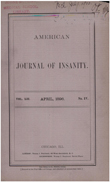Psychotherapy, revelation, science, and deep thinking
Abstract
Psychodynamic psychotherapy has evolved in the 30 years since John Nemiah was the author's mentor in the endeavor. It has always occupied an epistemologic position somewhere between the scientific standard of physics and the postmodern or poststructuralist view that the search for truth using language is totally futile. However, the awkward niche that psychotherapeutic practice occupies is closer to literary imagination than "hard science." The use of such imagination was presented 25 years ago by John Nemiah in his paper on "Deep Thinking." The poet's "revelation ... not discovered by the rational intellect alone" often imparts in psychotherapeutic practice a compelling urgency toward a previously unrealized choice. Such vision is, however, always located at the periphery of acceptable scientific theory. Psychotherapists persist, often with doubts, because their place is reflective of humanity's awkwardness. Evolution and civilization mutually enfold the human ability to resonate to the anguish of others as well. A species altruism directed toward repair of human problems is coupled with the skills of affectively linked "deep thinking." There is a continuing marginalization of such efforts, which now need to be cared for deeply.
Access content
To read the fulltext, please use one of the options below to sign in or purchase access.- Personal login
- Institutional Login
- Sign in via OpenAthens
- Register for access
-
Please login/register if you wish to pair your device and check access availability.
Not a subscriber?
PsychiatryOnline subscription options offer access to the DSM-5 library, books, journals, CME, and patient resources. This all-in-one virtual library provides psychiatrists and mental health professionals with key resources for diagnosis, treatment, research, and professional development.
Need more help? PsychiatryOnline Customer Service may be reached by emailing [email protected] or by calling 800-368-5777 (in the U.S.) or 703-907-7322 (outside the U.S.).



